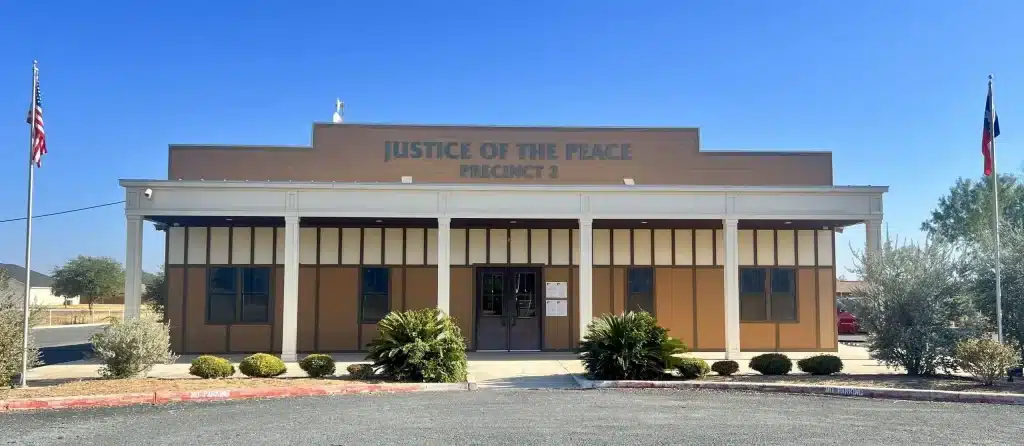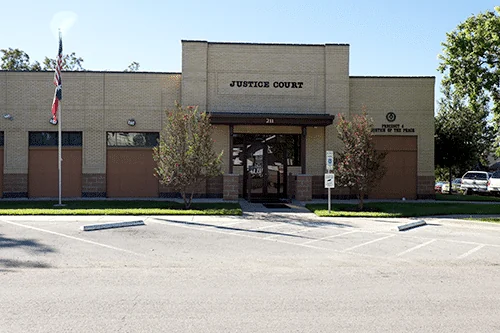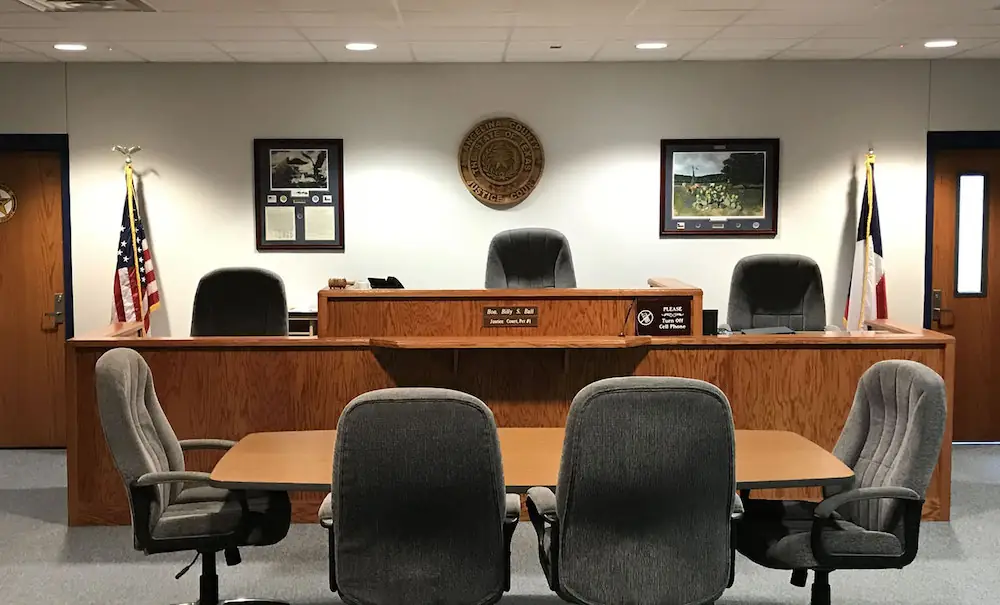Justice of the Peace Courts, also called justice courts, are lower courts in Texas that handle traffic cases and minor civil cases, including evictions and other landlord-tenant disputes, small claims, and debt claims. Each justice court is presided over by a type of elected judge called a Justice of the Peace (“JP”). In total, there are 796 justice courts in Texas, an average of about three per county.
The office of justice of the peace is among the oldest offices in Texas, dating to the republic era of 1836-1845, with roots in the local judicial and law enforcement practices of the largely autonomous American settlements established during the period of Mexican rule. Justices of the Peace have been part of the English and American systems of law for more than 800 years, though their functions have varied significantly in different eras, countries, and regions.
The office of Justice of the Peace is closely linked to that of constables, both historically and in the present day. Constables serve as bailiffs (court security) for JP courts and serve civil papers on their behalf, unlike district and county courts, which rely on sheriffs.
Elections of Justices of the Peace
In Texas, justices of the peace are selected in partisan elections. They serve four-year terms. In the event of a vacancy, the county commissioners court may appoint a justice of the peace.
Each justice of the peace is elected from the judicial precinct in which they reside, with up to eight precincts per county. That usually means that there are no more than eight justices of the peace per county, though some larger counties elect multiple justices of the peace per precinct.
Geographic Jurisdiction
In Texas, Justices of the Peace have jurisdiction within the justice precinct in which they are elected, which is a subdivision of a county. Each county is divided into at least one and up to eight justice precincts, depending on its population.
A JP’s authority is generally limited to their precinct, but in some cases, such as certain civil matters, it may extend throughout the county. JPs share their precinct boundaries with constables, who serve as their law enforcement officers, while county commissioners serve within commissioners precincts, which may or may not align with justice precincts.
For example, Harris County, the most populous county in Texas, has 16 justices of the peace serving across 8 precincts, with two JPs in most precincts. By contrast, many rural counties have only one or two precincts, each with a single justice of the peace.
Subject-Matter Jurisdiction
Justice of the Peace Courts have subject-matter jurisdiction over the following types of cases:
- Traffic Misdemeanors: Speeding, stop sign and red light violations, inspection sticker, driver license violations, etc.
- Minor Crimes: Public intoxication, disorderly conduct, petty theft, and other misdemeanor crimes punishable by fine only.
- Small Claims: Cases where the amount in dispute is less than $20,000.1
- Debt Claims: Cases where the amount concerned is less than $20,000.
- Repair and remedy: Cases where a tenant seeks remedy for a landlord’s failure to make repairs or maintenance within a dwelling.
- Evictions: Cases where a landlord seeks to remove a tenant from a rental property, typically due to non-payment of rent or violation of lease terms.
- Foreclosure of mortgages and enforcement of liens: Legal process where a lender seeks to recover the balance of a loan by forcing the sale of a property used as collateral for the loan, due to the borrower’s failure to meet payment obligations.
- Animal Control Cases: Cases involving violations of local animal control ordinances and laws, such as issues with dangerous dogs or cruelty to pets.
- Truancy: The chronic absence of a student from school without a valid excuse can be a violation of compulsory education laws. JPs may issue truancy citations, conduct hearings, and impose penalties, such as fines, on parents to ensure compliance with attendance requirements. They may also order a child to attend a counseling program, work or skills program, drug or alcohol program, etc.
Notably, Justice of the Peace may not sentence anyone to jail time. They only have jurisdiction in Class C misdemeanor cases, which are punishable by a fine only. More serious crimes are handled by county and district courts.
Likewise, more complex civil cases are handled by higher courts. Justice courts do not have jurisdiction in divorce cases, defamation cases, or lawsuits over land title.
For the most part, justice courts grant only monetary relief. They cannot issue injunctions or writs of mandamus, which are orders requiring a person to do something, or to refrain from doing something (such as not cutting down a tree on a disputed piece of land).
There are a few exceptions authorized by law, such as repair and remedy cases, truancy cases, and enforcement of deed restrictions. Overall, however, justices of the peace lack the wide-ranging power of injunction held by higher courts. This means that petitioners with complex cases typically do not file their case in a justice court.



Ceremonial and Administrative Duties
Other legal powers of justices of the peace include:
- Performing wedding ceremonies;
- Serving as the coroner in counties where there is no medical examiner;
- Serving as an ex officio notary public;
- Issuing occupational driver licenses;
- Administering oaths and affirmations in various situations.
The office of justice of the peace is among the oldest judicial roles in Texas, tracing its origins to the Republic of Texas in the 1830s. While the duties have evolved, JPs have long provided local, accessible forums for resolving minor disputes. Today, most of their powers and responsibilities are outlined in Texas Government Code Chapter 27.
Informalism in Justice Courts
The proceedings in civil cases in justice courts are more informal than in other courts in the Texas judiciary. Formal pleadings are not required.
According to Government Code sec. 27.060(b)(4), “The hearing is informal, with the sole objective being to dispense speedy justice between the parties.” Certain rules of the Texas Rules of Civil Procedure and Texas Rules of Evidence do not apply in justice courts.
Additionally, trials in justice courts are not “of record,” which means that they do not keep a record that is passed to a higher court on appeal.
Appeals from justice court are “de novo,” meaning the higher court conducts a completely new trial as if the original case had not been heard. Civil appeals generally must be filed within 21 days from the date the judgment is signed, and appellants must usually post an appeal bond.
Either side can request a jury trial in justice court, but the request must be in writing.
Magistrate Functions
In addition to their role adjudicating cases, justices of the peace may perform magistrate duties such as issuing warrants and setting bail. This gives them a procedural role in the criminal process for more serious offenses that are not heard in justice courts themselves, though typically only at the early stage.
For instance, justices of the peace may hold preliminary hearings (the first appearance of a defendant before a judge after being booked in jail), at which they determine whether there was probable cause for an arrest, and decide whether to release the accused or jail him.
As a magistrate, a justice of the peace may also review probable-cause affidavits and issue search warrants and arrest warrants.
The Texas judiciary is structured to allow Justice of the Peace to handle magistration duties even though they do not typically preside over serious criminal offenses. By having JPs perform these preliminary tasks, it allows the more specialized county and district courts to focus on the trials of serious criminal cases, which are beyond the JP’s jurisdiction.
Issuing warrants, probable cause determinations, and setting bail are critical, time-sensitive duties that ensure due process is followed before cases move to a higher court.
Qualifications for Office
There are no minimum legal qualifications to become a justice of the peace. This is a key difference between justices of the peace and judges of county courts, district courts, and appellate courts, who are required to be licensed to practice law.
However, after assuming office a justice of the peace must obtain 80 hours of continuing education during their first year in office and 20 hours annually thereafter.
Justice Court Statistics
Texas justice courts disposed of 1.3 million criminal cases in fiscal year 2022, of which about 1.1 million were traffic and parking cases. Justice courts also handled thousands of juvenile cases.
Justice courts disposed of about 600,000 civil cases in fiscal year 2022. Of the civil cases disposed, 48.3% were debt claims, 41.7% were landlord-tenant cases, and 0.1% were small claims cases (numbers rounded).
During the year justice courts issued 1,923 search warrants and more than 270,000 arrest warrants. They held 12,655 emergency mental health hearings.
These numbers are based on data reported by the justice courts to the Office of Court Administration, with a reporting rate of 95 percent.
- In both small claims and debt claims, the $20,000 jurisdictional limit includes any interest owed but does not include court costs. This maximum is set by statute and may be revised by the Texas Legislature. ↩︎



